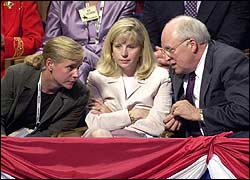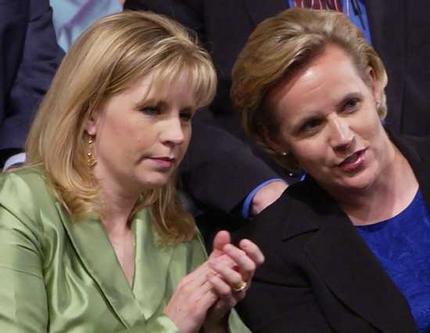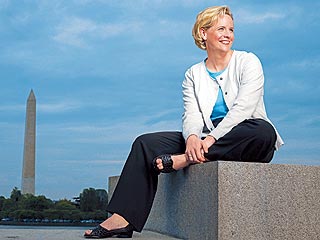|
|
|||||||||||||||||||||||||||||||
|
Dick Cheney supports Gay Marriages
Cheney Proud of his Lesbian Daughter, at odds with Bush Administration[Right] Dick Cheney confers with daughters, Mary, left, who is lesbian, and Elizabeth, at the 2000 Republican convention. Mary is in charge of her fatherís travel and appearances in the 2004 campaign. U.S. Vice-President Dick Cheney has spelled out his differences with President George W. Bush on the volatile issue of gay marriage while making his most revealing public comments yet about the sexual orientation of his lesbian daughter. Asked for his stand at a town hall meeting here, Cheney replied: "Lynne and I have a gay daughter, so it's an issue that our family is very familiar with ... my general view is that freedom means freedom for everyone. People ... ought to be free to enter into any kind of relationship they want to." That stands in stark contrast to Bush, who has endorsed amending the U.S. constitution to prevent states from recognizing such marriages, and to manoeuvring by Republican conservatives to include a constitutional ban on same-sex marriage and language opposing legal recognition of any gay civil unions in the 2004 election platform. In his speech Tuesday night, Cheney reiterated the position he outlined in the 2000 campaign ó that same-sex marriage should be left to states to decide, but added: "The president makes basic policy for the administration. And he's made it." The Family Research Council, a conservative group with close White House ties, called Cheney's remarks disappointing. "Unfortunately, protection of our values is made more difficult when mixed messages emanate from the White House," said its president Tony Perkins. Bush officials said Cheney has such goodwill among conservatives that the White House isn't worried about political fallout. Mary Cheney works for the campaign as director of vice-presidential operations, responsible for her father's political travel and appearances. "We have two daughters, and we have enormous pride in both of them," Cheney said.
Commentary by Suzy MacNevin Well, its about time someone on the Republican side finally stood up for gay/lesbian rights! For too long the Republican Party has been sticking to a NAZI oriented view of the world. Kill Arabs, bomb civilians, censor the media, throw people in concentration camps, and make life difficult for gays/lesbians. Some Americans (many of them Republicans) would gladly just have the government kill all the gays and lesbians, but thankfully those KKK/NRA members are too busy at home collecting their NAZI memorabilia and stroking their guns lovingly. But now Dick has announced that not only is his daughter a lesbian, but he disagrees with Bush on the whole gay rights issue (Hurrah for Dick!). I think this is a wonderful idea! More Republicans should step forward and announce their disagreements. Starting with their disagreements over the war in Iraq.
Colin Powell for example has already made his opinion clear. He was against the war because he knew it had nothing to do with terrorism, and eveything to do with oil. Ahem. That begs to be repeating and rephrased. Colin Powell was against the war in Iraq because it was really about oil. When a member of the Bush Administration actually admits that it was just about oil, you have to wonder why Bush hasn't been impeached yet? Its all that flag-waving and chanting U - S - A... its like a regular NAZI rally. Patriotism taken too far combined with ignorance. Yippee! The United States is one step closer to Gay Liberation!
Same-sex marriage ban faces pivotal year in 2008By the time the 2008 legislative session ends in March, one of those two fates awaits a proposed amendment to Indiana's Constitution that would ban same-sex marriages. To amend the constitution, two consecutively elected legislatures must pass the measure. Voters must then approve it in a general election. The General Assembly passed the amendment in 2005 but has failed to do so since. If lawmakers in both the House and Senate pass the amendment this session, voters would get their say in November. But if the amendment fails, the lengthy process would have to start over again. Supporters of the proposed ban don't want to see that happen. "This is an issue where the legislators need to remember that the people of Indiana need the opportunity to vote to protect marriage," said Eric Miller, founder of the conservative activist group Advance America. "We have to let the people decide." Indiana has a state law that bans same-sex marriages. But supporters say an amendment is necessary to prevent judges from overturning the law and allowing gay marriages. Opponents say the amendment would extend constitutional protections to discriminatory behavior and that political and social conservatives are using the divisive issue as a way to drive voters to the polls. Republican and Democratic lawmakers alike supported the amendment's first sentence, which defines marriage as the union between a man and a woman. But that was outweighed by concerns over its second phrase, which says state law "may not be construed to require that marital status or the legal incidents of marriage be conferred upon unmarried couples or groups." That sentence, foes of the amendment argue, could jeopardize domestic-partner benefits, weaken domestic-violence laws and hurt Indiana companies' ability to recruit top employees. In 2005, when Republicans controlled the Senate and House, both chambers voted overwhelmingly to pass the amendment. In 2007, with Democrats in control of the House, the amendment died in committee. Amendment backers accused House Speaker B. Patrick Bauer of breaking a promise to allow the full House to vote on the issue. Bauer, D-South Bend, denied that and maintained he promised to allow the measure to run through the legislative process. Bauer has not said whether he intends to allow the amendment to be heard this year. On three occasions, the Senate has approved the amendment first and passed it on to the House. That, however, won't happen this session. Sen. Brandt Hershman, R-Wheatfield, has sponsored the amendment in the Senate in past instances. Though he said he'd do so again this session, Hershman said it will be up to the House to pass the amendment first. "I don't see a benefit in the Senate stating a view it has stated three times previously," Hershman said. "There is little use to move it forward if the House is simply going to block further consideration. "I'm looking to the House to initiate the process this time around." That means Rep. P. Eric Turner, R-Marion, will be charged with pushing the measure first -- a job that he said he's willing to tackle. "I think Senator Hershman is probably tired of starting it and seeing it die in the House at the hands of the speaker," Turner said. "I'm certainly willing to start something in the House." Miller, one of the state's most prominent lobbyists and a key supporter of the amendment, said he would encourage both the House and Senate to consider the amendment simultaneously. But Walter Botich, the legislative chair for Indiana Equality, a gay rights advocacy organization, said lawmakers have more urgent issues, namely a property-tax crisis, to sort out. His group opposes the amendment. "We have more pressing issues to deal with this session, and property taxes are on everyone's minds," Botich said. "The issue no longer seems as important to most, I think." A recent poll conducted for The Indianapolis Star and WTHR (Channel 13) supports that notion. The November statewide survey showed that 49 percent of Hoosiers support the amendment, down from 56 percent in 2005. "This (amendment) was a tool to turn out voters, but since then, the general public has wised up," Botich said. "They realize this isn't a pressing issue, it's made to divide people, and it's something that Indiana doesn't need." Gov. Mitch Daniels has no say on constitutional amendments and generally has steered clear of the issue, saying it's a legislative decision. In a recent Star interview, however, he indicated a measure of support. He said he was "a believer in traditional marriage and a supporter of the law we have on the books now" and that he agreed "with the idea of protecting it (the law) against some creative judicial ruling in the future." Amendment supporters point to a recent court ruling in Iowa as good reason to push the ban through. A county judge there ruled that the state's law banning same-sex marriages violated the constitutional rights of due process and equal protection of six gay couples who had sued. For four hours, gay couples had the right to marry in Iowa before the same judge delayed the issuance of any more same-sex marriage licenses until the matter could be heard by the state's Supreme Court. "To those in the House who say they believe in marriage as (an institution) between one man and one woman but don't think there's a need for a constitutional amendment, all they have to do is look at what happened over the summer in Iowa," said, Turner, the Republican from Fort Wayne. "That should give us some momentum going into the session." Botich, of Indiana Equality, doubts it. "I don't think that strengthens their argument at all," he said. "At this point, Hoosier voters and Hoosiers in general are tired of this issue."
|
|
||||||||||||||||||||||||||||||
|
Website Design + SEO by designSEO.ca ~ Owned + Edited by Suzanne MacNevin | |||||||||||||||||||||||||||||||


